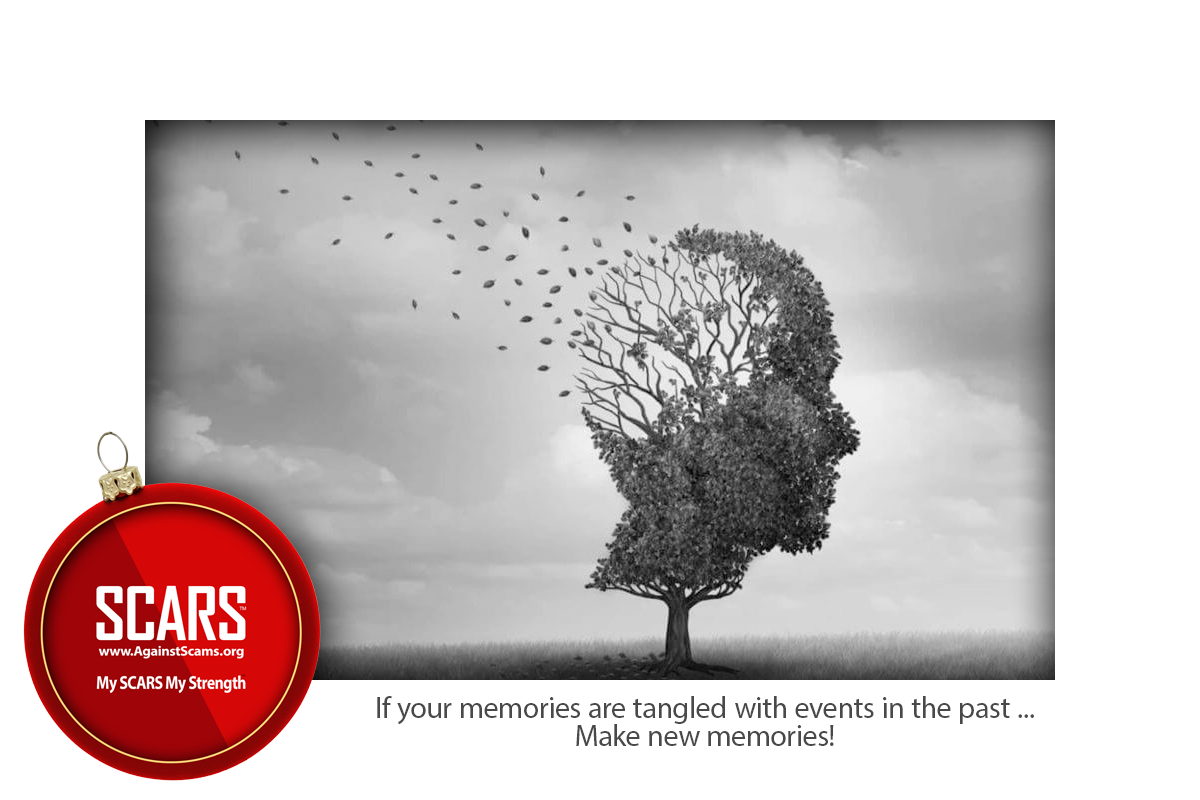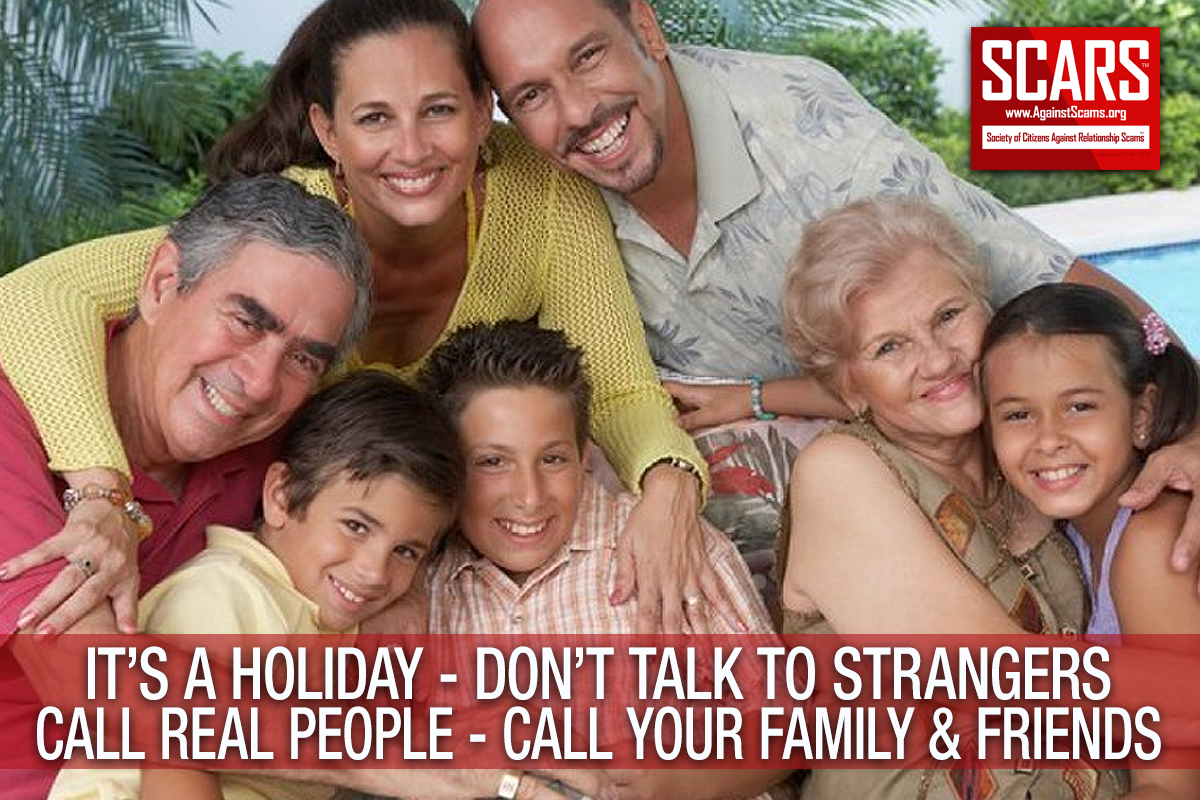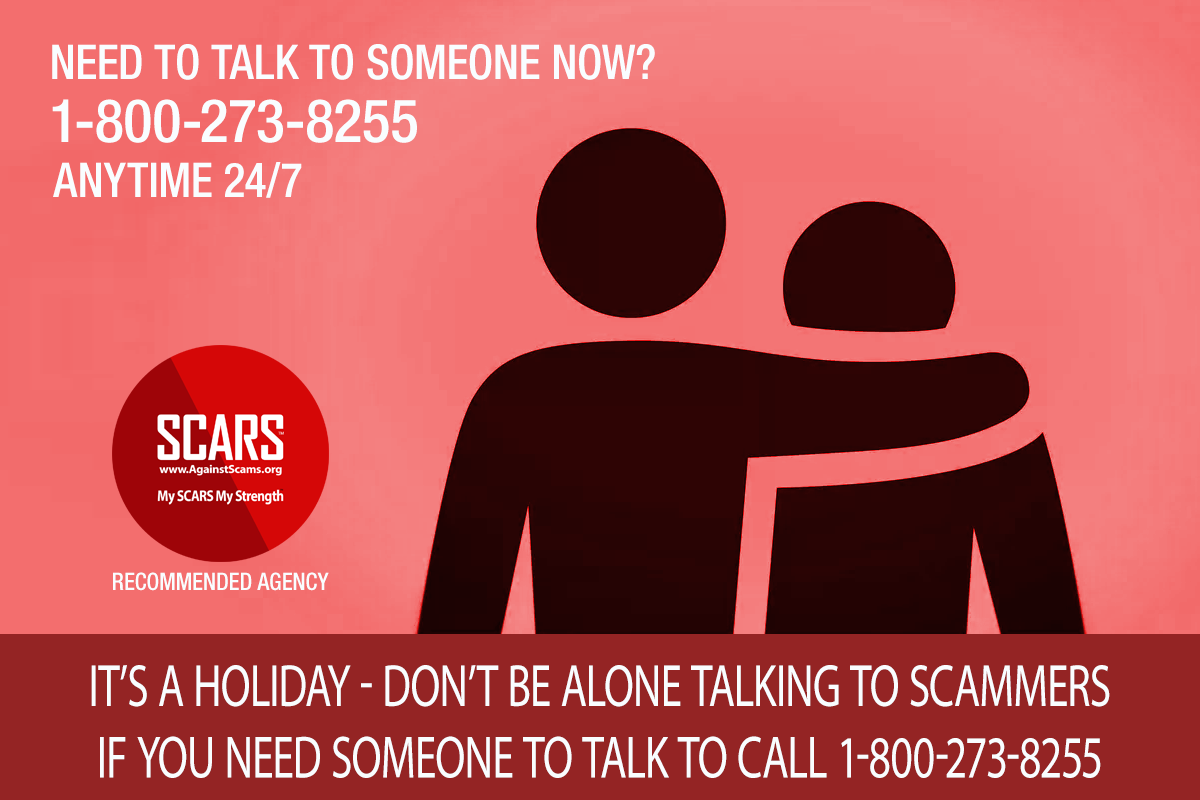Romance Scam Victims & The Holidays
Navigating Your First Holiday Season Without a Loved One – Fake Loved One!
Author:
• Tim McGuinness, Ph.D. – Anthropologist, Scientist, Director of the Society of Citizens Against Relationship Scams Inc.
Navigating the Holidays For Scam Victims After a Romance Scam: Healing from Deception and Betrayal
The holidays period is intended to be a time filled with happiness, unity, and festivity. For most of us, the holiday season shimmers with joyous anticipation, a time for festive gatherings and cherished traditions.
However, amidst the twinkling lights and cheerful carols, a different reality exists for scam victims reeling from the wreckage of a shattered romance scam relationship. This pain takes on a unique and often misunderstood dimension when the relationship itself was a cruel illusion – a romance scam. For romance scam victims who have been ensnared in a romance scam, the festivities can become a poignant reminder of loss, heartache, and the devastating aftermath of betrayal.
Romance Scams and the Pain of Deception
Romance scams, built on deceit, manipulation, and false promises, leave scam victims grappling with emotional wreckage. Despite knowing the relationship was built on lies, the emotional investment made during the romance scam often leads to genuine feelings of loss and mourning – to grief and even trauma. Scam Victims face the painful reality of investing trust, love, and hope in a relationship—a connection that never truly existed.
Falling victim to a romance scam can be an emotionally devastating experience. The perpetrator, skilled in the art of deception, weaves a web of affection and intimacy, dropping love bombs (amygdala hijacks) to force the victim to feel, blurring the lines between fantasy and reality. Hours spent conversing, promises whispered, and dreams shared create a powerful bond, even though built on lies.
When the veil finally lifts, revealing the truth of deceit and manipulation, the emotional fallout can be immense. Grief washes over the scam victim, not just for the lost relationship, but for the stolen trust, the wasted time, and the shattered sense of identity, not to mention the financial loss (if any.) Feelings of betrayal, anger, and profound sadness intertwine, creating a tangled knot of heartache.
The holidays, typically a time for togetherness and shared joy, can amplify this grief and trauma.
Seeing joyous family and friends, couples strolling hand-in-hand, families gathered around crackling fires, or exchanging love-filled gifts – all these reminders of what should have been can feel like salt in an open wound. The loneliness may feel heavier, the laughter of others more piercing, and the festive decorations a cruel mockery of the emptiness within.
Romance Scams Holiday Triggers and Emotional Turmoil
As the holiday season approaches, memories of what was believed to be a budding romance intensify the grief and trauma.
Traditions, songs, and shared dreams that were once envisioned together become painful reminders of a relationship scam fabricated by some criminal gang half a world away.
The loneliness and longing for the companionship that was promised all contribute to the emotional turmoil.
However, it’s crucial to remember that grieving this loss, even though it stemmed from a fraudulent or fake romance scam relationship, is valid and natural. The emotional investment made was real, the vulnerability genuine. The brain doesn’t distinguish between a genuine and a fabricated connection; the pain of loss resonates profoundly.
It is also important that all scam victims know that it was not their fault and they are not alone. Millions of others have been through the same experience and are facing the same pain. This is one of the reasons why professional support is so important, so that scam victims can be part of a community of people that understand that pain, with professional guidance to help them better understand how this all works and to help them through.
Scam victims can get help by signing up for SCARS Support at support.AgainstScams.org
Navigating Scam Victim Emotional Resilience
Coping with the aftermath of romance scams during the holidays is an uphill battle.
Victims are often plagued by self-blame, shame, and a sense of isolation. It’s crucial to acknowledge the legitimacy of the pain despite the fraudulent nature of the romance scam relationship. Seeking support from friends, family, or professional counselors, and joining a professional support & recovery program is instrumental in navigating this the way through the pain.
The road to healing after a romance scam is not linear. There will be setbacks and moments of intense sadness. But with time, self-compassion, and support, the path forward will become clearer, and the warmth of genuine connections will eventually replace the chill of deception.
Overcoming the Stigma
Victims of romance scams may feel reluctant to share their ordeal due to fear of judgment or embarrassment, and they are right to feel this was as many people react out of their own fear. Society’s perception of online relationships or scams can exacerbate this hesitation. However, understanding that the emotional toll of such betrayal is genuine, regardless of the circumstances, is vital in fostering empathy and support.
Watch this SCARS video below to better understand how scam victims can tell their story to family and friends!
Cultivating Healing and Self-Care
Rebuilding shattered trust and reclaiming emotional well-being takes time and intentional effort. Engaging in self-care practices such as mindfulness, journaling, or pursuing hobbies can offer solace and aid in the healing process. Establishing new holiday traditions or volunteering can also provide a sense of purpose and connection.
Finding A Path and Moving Forward for Scam Victims
Healing from the aftermath of a romance scam is a journey that demands resilience, self-compassion, and a commitment to recovering.
Acknowledging the pain, seeking support, and allowing oneself to grieve the loss of what was believed to be real is crucial. As difficult as it may seem, the holiday season can also serve as a time of reflection, growth, and the beginning of a new chapter filled with lessons learned and renewed strength.
Here are some ways to navigate this challenging holiday season:
- Acknowledge your grief: Don’t suppress your emotions. Allow yourself to grieve the relationship, the lost hope, and the shattered trust. Talk to a trusted friend, family member, support group or therapist about your feelings.
- Practice self-compassion: You are not alone, and you are not to blame. Romance scams are designed to exploit human emotions, and becoming a scam victim doesn’t reflect on your intelligence or worth. Be kind to yourself and prioritize your emotional well-being.
- Focus on positive connections: Surround yourself with supportive loved ones who offer genuine affection and emotional comfort. Reconnect with hobbies and activities that bring you joy.
- Seek professional help: If the grief feels overwhelming, reaching out to a therapist experienced in supporting victims of scam-related trauma can be immensely beneficial. Find professionals here: counseling.AgainstScams.org
- Remember, healing takes time: Be patient with yourself. The holidays may feel particularly hard, but the pain will gradually lessen with time and support. SCARS is here for you throughout the holidays, but if you need to talk to someone call 988 now, they are there to be a supportive voice on the phone for you!
Summary
For those navigating the aftermath of a romance scam during the holidays, the journey is undeniably challenging. However, by acknowledging the legitimacy of the emotional turmoil, seeking support, and fostering self-compassion, victims can begin to heal and find hope in reclaiming their lives, their joy, and their sense of trust in genuine connections.
This holiday season, remember that even amidst the festive glow, there are others walking in the shadows of loss. Offer compassion, understanding, and a listening ear to those navigating this unique heartbreak. Together, we can create a space where all are seen, heard, and supported, even during the most challenging times.
SCARS Webinar: Telling Your Story – Telling Your Family & Friends
If You Need To Talk With Someone NOW!
Please call 988 in the U.S. or Canada to talk with someone that is there to listen and help you!
For Worldwide Crisis Hotlines: https://blog.opencounseling.com/suicide-hotlines/
To join a SCARS Support & Recovery Group visit support.AgainstScams.org
More:
- Recovery From Scams – Article Catalog (romancescamsnow.com)
- About Recovery & Support (romancescamsnow.com)
- Letting Go Of The Scammers For Your Recovery! 2023 (romancescamsnow.com)
- From Victim To Survivor (romancescamsnow.com)
- 10 Steps To Breaking Free & Beginning Your Recovery (romancescamsnow.com)
- Fear Of Contagion: Why Scam Victims Are Harshly Judged And Blamed 2023 (scamsnow.com)
- Filling The Victim Void After The Fake Relationship Is Gone 2023 (scamsnow.com)
- Toxic Self-Narratives That Feeds Depression in Scam Victims 2023 (scamsnow.com)
- 3 Steps For New Victims (romancescamsnow.com)
- Signs of Good & Bad Scam Victim Emotional Health (romancescamsnow.com)
- Managing Your Emotional 5 Saboteurs (romancescamsnow.com)
- Psychological Triggers/Emotional Triggers – What They Are And How They Work – 2023/2024 (scamsnow.com)
SCARS Resources:
- For New Victims of Relationship Scams newvictim.AgainstScams.org
- Subscribe to SCARS Newsletter newsletter.againstscams.org
- Sign up for SCARS professional support & recovery groups, visit support.AgainstScams.org
- Find competent trauma counselors or therapists, visit counseling.AgainstScams.org
- Become a SCARS Member and get free counseling benefits, visit membership.AgainstScams.org
- Report each and every crime, learn how to at reporting.AgainstScams.org
- Learn more about Scams & Scammers at RomanceScamsNOW.com and ScamsNOW.com
- Global Cyber Alliance ACT Cybersecurity Tool Website: Actionable Cybersecurity Tools (ACT) (globalcyberalliance.org)
- Self-Help Books for Scam Victims are at shop.AgainstScams.org
- Donate to SCARS and help us help others at donate.AgainstScams.org
- Worldwide Crisis Hotlines: International Suicide Hotlines – OpenCounseling : OpenCounseling
- Campaign To End Scam Victim Blaming – 2024 (scamsnow.com)
More ScamsNOW.com Articles
-/ 30 /-
What do you think about this?
Please share your thoughts in a comment below!
SCARS LINKS: AgainstScams.org RomanceScamsNOW.com ContraEstafas.org ScammerPhotos.com Anyscam.com ScamsNOW.com
reporting.AgainstScams.org support.AgainstScams.org membership.AgainstScams.org donate.AgainstScams.org shop.AgainstScams.org
youtube.AgainstScams.org linkedin.AgainstScams.org facebook.AgainstScams.org
One Comment
Leave A Comment
Important Information for New Scam Victims
- Please visit www.ScamVictimsSupport.org – a SCARS Website for New Scam Victims & Sextortion Victims.
- SCARS Institute now offers its free, safe, and private Scam Survivor’s Support Community at www.SCARScommunity.org – this is not on a social media platform, it is our own safe & secure platform created by the SCARS Institute especially for scam victims & survivors.
- SCARS Institute now offers a free recovery learning program at www.SCARSeducation.org.
- Please visit www.ScamPsychology.org – to more fully understand the psychological concepts involved in scams and scam victim recovery.
If you are looking for local trauma counselors, please visit counseling.AgainstScams.org
If you need to speak with someone now, you can dial 988 or find phone numbers for crisis hotlines all around the world here: www.opencounseling.com/suicide-hotlines
Statement About Victim Blaming
Some of our articles discuss various aspects of victims. This is both about better understanding victims (the science of victimology) and their behaviors and psychology. This helps us to educate victims/survivors about why these crimes happened and not to blame themselves, better develop recovery programs, and help victims avoid scams in the future. At times, this may sound like blaming the victim, but it does not blame scam victims; we are simply explaining the hows and whys of the experience victims have.
These articles, about the Psychology of Scams or Victim Psychology – meaning that all humans have psychological or cognitive characteristics in common that can either be exploited or work against us – help us all to understand the unique challenges victims face before, during, and after scams, fraud, or cybercrimes. These sometimes talk about some of the vulnerabilities the scammers exploit. Victims rarely have control of them or are even aware of them, until something like a scam happens, and then they can learn how their mind works and how to overcome these mechanisms.
Articles like these help victims and others understand these processes and how to help prevent them from being exploited again or to help them recover more easily by understanding their post-scam behaviors. Learn more about the Psychology of Scams at www.ScamPsychology.org
SCARS INSTITUTE RESOURCES:
If You Have Been Victimized By A Scam Or Cybercrime
♦ If you are a victim of scams, go to www.ScamVictimsSupport.org for real knowledge and help
♦ SCARS Institute now offers its free, safe, and private Scam Survivor’s Support Community at www.SCARScommunity.org/register – this is not on a social media platform, it is our own safe & secure platform created by the SCARS Institute especially for scam victims & survivors.
♦ Enroll in SCARS Scam Survivor’s School now at www.SCARSeducation.org
♦ To report criminals, visit https://reporting.AgainstScams.org – we will NEVER give your data to money recovery companies like some do!
♦ Follow us and find our podcasts, webinars, and helpful videos on YouTube: https://www.youtube.com/@RomancescamsNowcom
♦ Learn about the Psychology of Scams at www.ScamPsychology.org
♦ Dig deeper into the reality of scams, fraud, and cybercrime at www.ScamsNOW.com and www.RomanceScamsNOW.com
♦ Scam Survivor’s Stories: www.ScamSurvivorStories.org
♦ For Scam Victim Advocates visit www.ScamVictimsAdvocates.org
♦ See more scammer photos on www.ScammerPhotos.com
You can also find the SCARS Institute’s knowledge and information on Facebook, Instagram, X, LinkedIn, and TruthSocial
Psychology Disclaimer:
All articles about psychology and the human brain on this website are for information & education only
The information provided in this and other SCARS articles are intended for educational and self-help purposes only and should not be construed as a substitute for professional therapy or counseling.
Note about Mindfulness: Mindfulness practices have the potential to create psychological distress for some individuals. Please consult a mental health professional or experienced meditation instructor for guidance should you encounter difficulties.
While any self-help techniques outlined herein may be beneficial for scam victims seeking to recover from their experience and move towards recovery, it is important to consult with a qualified mental health professional before initiating any course of action. Each individual’s experience and needs are unique, and what works for one person may not be suitable for another.
Additionally, any approach may not be appropriate for individuals with certain pre-existing mental health conditions or trauma histories. It is advisable to seek guidance from a licensed therapist or counselor who can provide personalized support, guidance, and treatment tailored to your specific needs.
If you are experiencing significant distress or emotional difficulties related to a scam or other traumatic event, please consult your doctor or mental health provider for appropriate care and support.
Also read our SCARS Institute Statement about Professional Care for Scam Victims – click here
If you are in crisis, feeling desperate, or in despair, please call 988 or your local crisis hotline – international numbers here.
More ScamsNOW.com Articles
A Question of Trust
At the SCARS Institute, we invite you to do your own research on the topics we speak about and publish. Our team investigates the subject being discussed, especially when it comes to understanding the scam victims-survivors’ experience. You can do Google searches, but in many cases, you will have to wade through scientific papers and studies. However, remember that biases and perspectives matter and influence the outcome. Regardless, we encourage you to explore these topics as thoroughly as you can for your own awareness.





























![NavyLogo@4x-81[1] Romance Scam Victims & The Holidays - 2023](https://scamsnow.com/wp-content/uploads/2025/04/NavyLogo@4x-811.png)
![scars-institute[1] Romance Scam Victims & The Holidays - 2023](https://scamsnow.com/wp-content/uploads/2025/04/scars-institute1.png)

![niprc1.png1_-150×1501-1[1] Romance Scam Victims & The Holidays - 2023](https://scamsnow.com/wp-content/uploads/2025/04/niprc1.png1_-150x1501-11.webp)
I can’t thank enough for the help and support SCARS provide for us, victims of romance scam. This article is fenomenal and perfectly describes the sad emotions during the holiday times, plus the ways to find support to survive the season. May 2024 be a year of healing and awareness so no more women fall for these schemes.